Points of Perspective
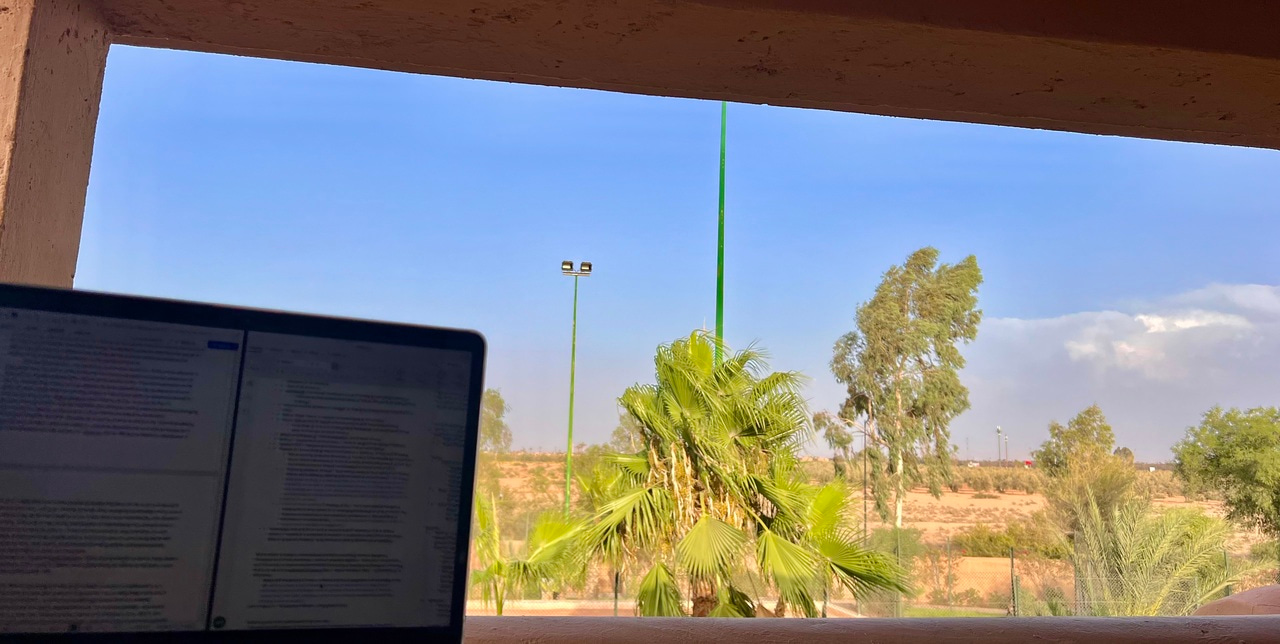
I write this blog (and a large section of my research paper) from a balcony just outside of Marrakesh, Morocco – a balcony that has seen me furiously typing away each day between lunch and dinner. In return, I have seen only the desert in front of me, scattered with an olive grove to my right, and shrubs and palms to my left. On a clear day I can see the Atlas Mountains in the distance, but there has been no clarity for 5 days.
Sometimes I feel the same way about my writing.
Reflecting on the last few months of research and writing, I have realised the importance of perspective – both for the purposes of my written argument, and for my own mindset while writing. Within my paper, I attempt to demonstrate how, unlike our Western perspectives of birds-eye-view maps, concrete words written in academic articles, and the facts of science, Pacific peoples see the world in an interconnected and ever-changing manner that often centres around the perspective of the observer (Thompson, 2020). In this way, I have been arguing how important perspective can be for understanding alternative worldviews that can help broaden global understandings and diversify thought within climate discussions.
While writing this same explanation in my paper, I found myself stumped as I faced the seemingly impossible task of conveying the importance and complexity of Pacific worldviews within climate discussions to a general audience. How could I possibly succinctly explain a complex topic I have been studying in-depth for months to someone reading my paper, who’s knowledge extent of knowledge of the Pacific may only be the Disney movie ‘Moana’?
I have never found the answer to this question. I have only found a different perspective.
Reflecting on my own argument of the importance of Pacific worldviews, I put myself in the perspective of the observer. Sat in each environment that I have been writing in, I am able to observe and come to better understand my own emotions when I approach writing each day.
Some days, I feel like my research paper will simply be submitted into the online void and never read by anyone.
It’s just more black words on a white page on a flat screen on someone’s desk or in someone’s hand.
On those days, writing can feel easy because it feels pointless.
On other days, I feel my passion for this topic and an excitement for the potential it could hold, dreaming of reaching a wider audience and having someone read it and feel they have learned something – to feel they have connected.
It is more hope in the world, more potential for action, more done to make the world a better place.
On those days, writing can feel monumental, and my typing hands slow under the pressure of perfection.
Sat on this balcony now, I can trace the story of these changing perspectives throughout the previous months by picturing the perspectives from each view I have had while writing. Space café in St Andrews, St Mary’s library, my desk in the spare bedroom at home, my local Cathedral reading room, my balcony on holiday. Each is paired with my mental journey: a crisis of the scale of this research summer, a calmness in simply reading a new article each day, the looming fear of not having enough time to write, the quiet peace of forcing myself to steel my nerves, and finally…
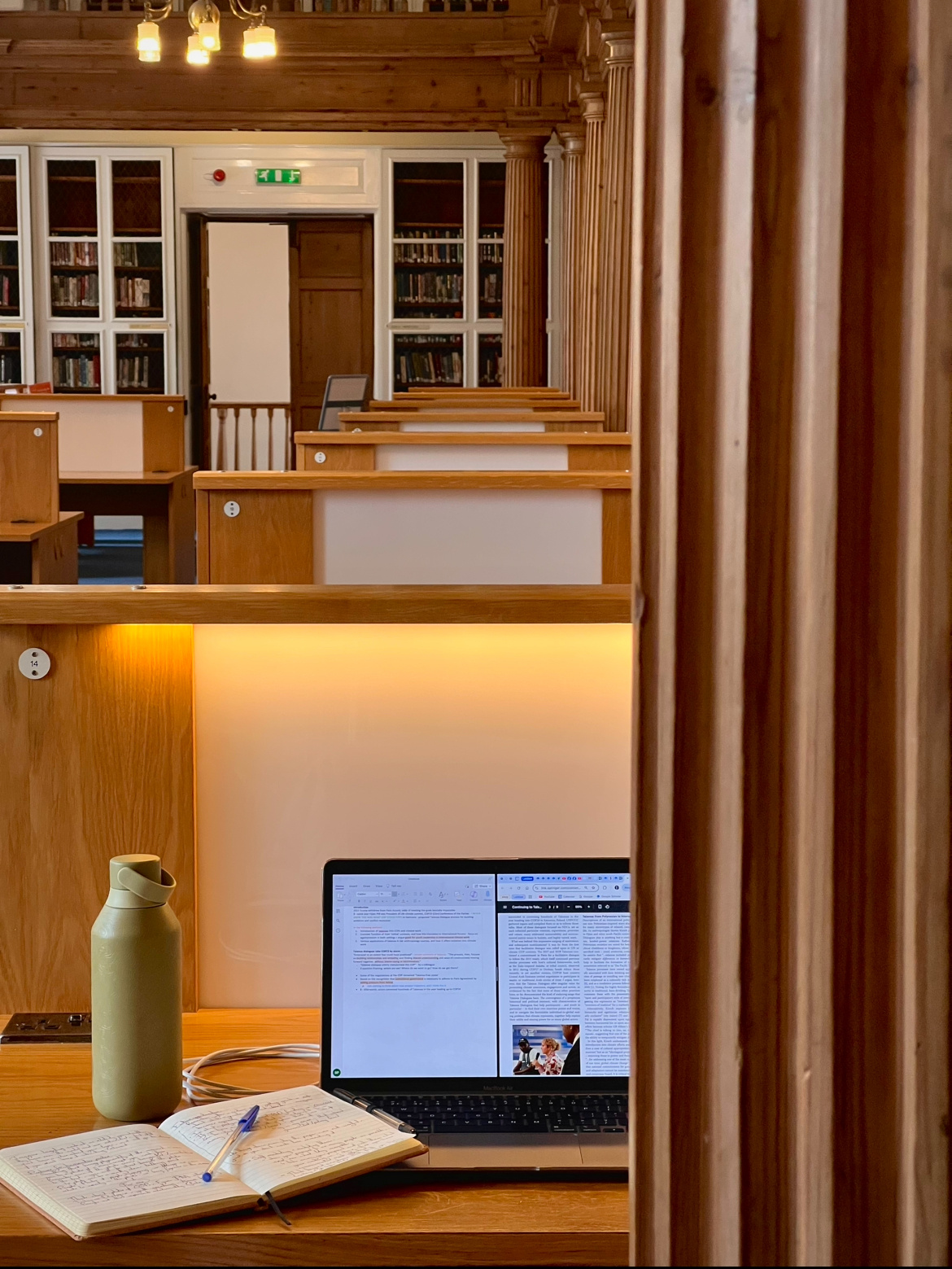
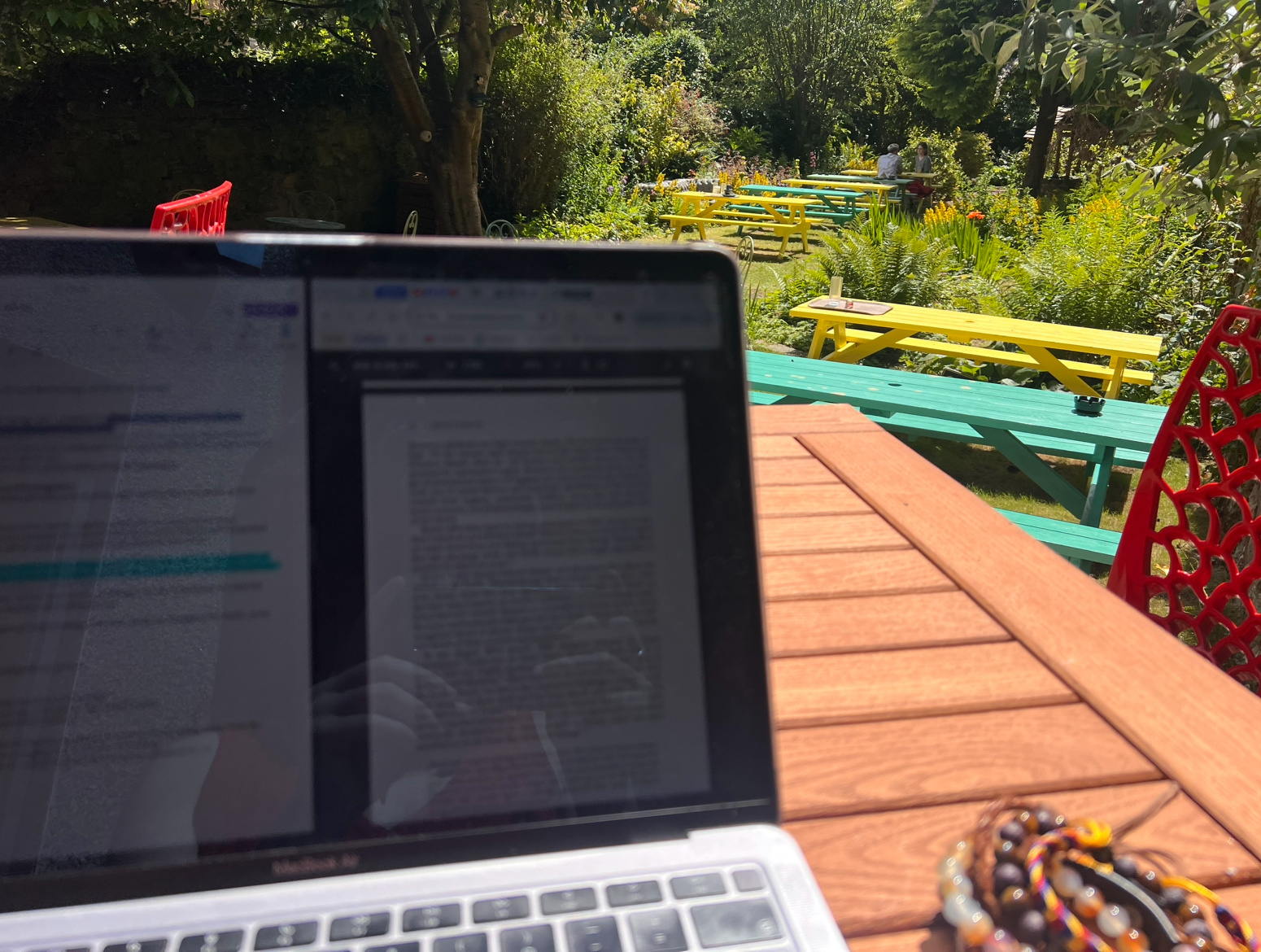
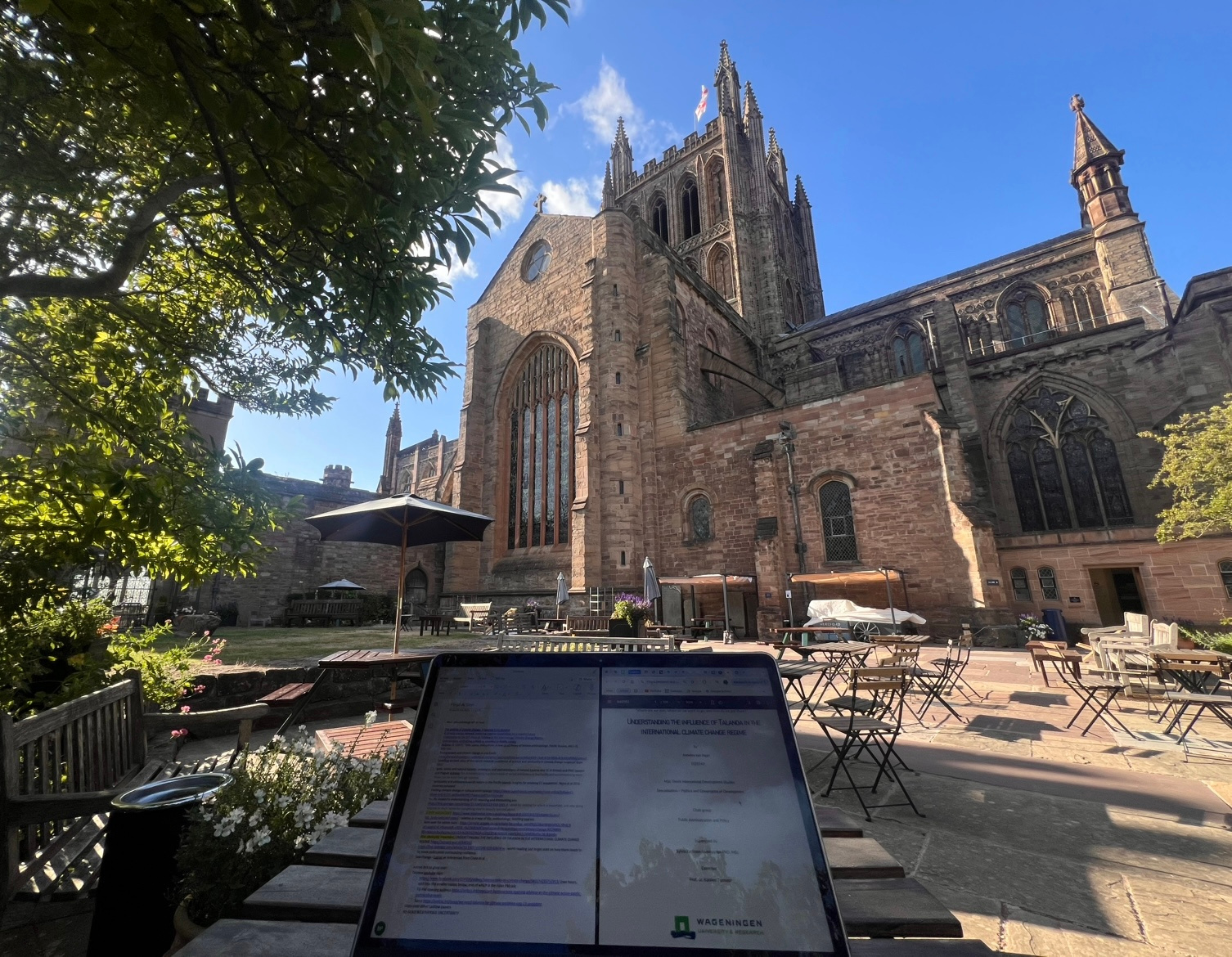
- Photos of some of the views I have written and researched from. Ordered top to bottom: St Marys Library St Andrews, Space Cafe garden St Andrews, Hereford Cathedral Garden
Truth is, I could not tell you how I feel today. These perspectives – where my mindset is on the dread to excitement spectrum that I’m sure many of my fellow scholars can resonate with – can change day to day, hour to hour, and even by the minute. Just this morning, I felt a simplicity in writing this blog as a break from the density of my essay. Just now, I feel the stress of not getting it written before dinner.
So, my final reflection on the Laidlaw research summer is not a definitive one, but rather an acceptance of how fluid the last few months have been, and a realisation of how that fluidity can also determine my approach to writing. In an extension of the sentiment that 'learning is a process', I can now also see that changing perspectives are perhaps more like a racetrack. A winding circle with no pattern or reason; I know at some point after so many laps I will reach an end, but for now I’m left breaking and accelerating through corners that take me further towards stress, or closer towards hope. Part of acknowledging this is also realising that of course, whenever I feel I’ve been on a straight sprint of worries for too long, at some point I will always round a corner into a new perspective of resolution, in the same way I must accept that peaceful stretches can quickly veer off into fears.
I also hope this reflection can give my fellow scholars some solace if you are feeling the same thing. I think in the final few weeks before the deadline, and in the wider context of life in general, we are all on this racetrack together. We don't have to feel great about our progress every day, so long as we make it round the next bend.
With this winding and fluid message, I leave you on a more grounding moment of dual perspective that I found amongst the souks of Marrakesh. A quote that incited both pressure and peace as it reminded me of the core message of my research (and thus the anticipation of the writing I had to return to later) but also the realisation that this message of mine – the importance of connecting with people and their varied perspectives in our changing world – is one that can be found everywhere.
‘At a moment when the world is becoming both more interconnected and more isolated, it is essential to grasp this simple yet profound concept of humanity, along with the power of knowledge, inclusion, and transmission.’
- Quoted from the description of the Patti Birch Collection in Dar El Bacha Museum, Marrakesh, Morocco
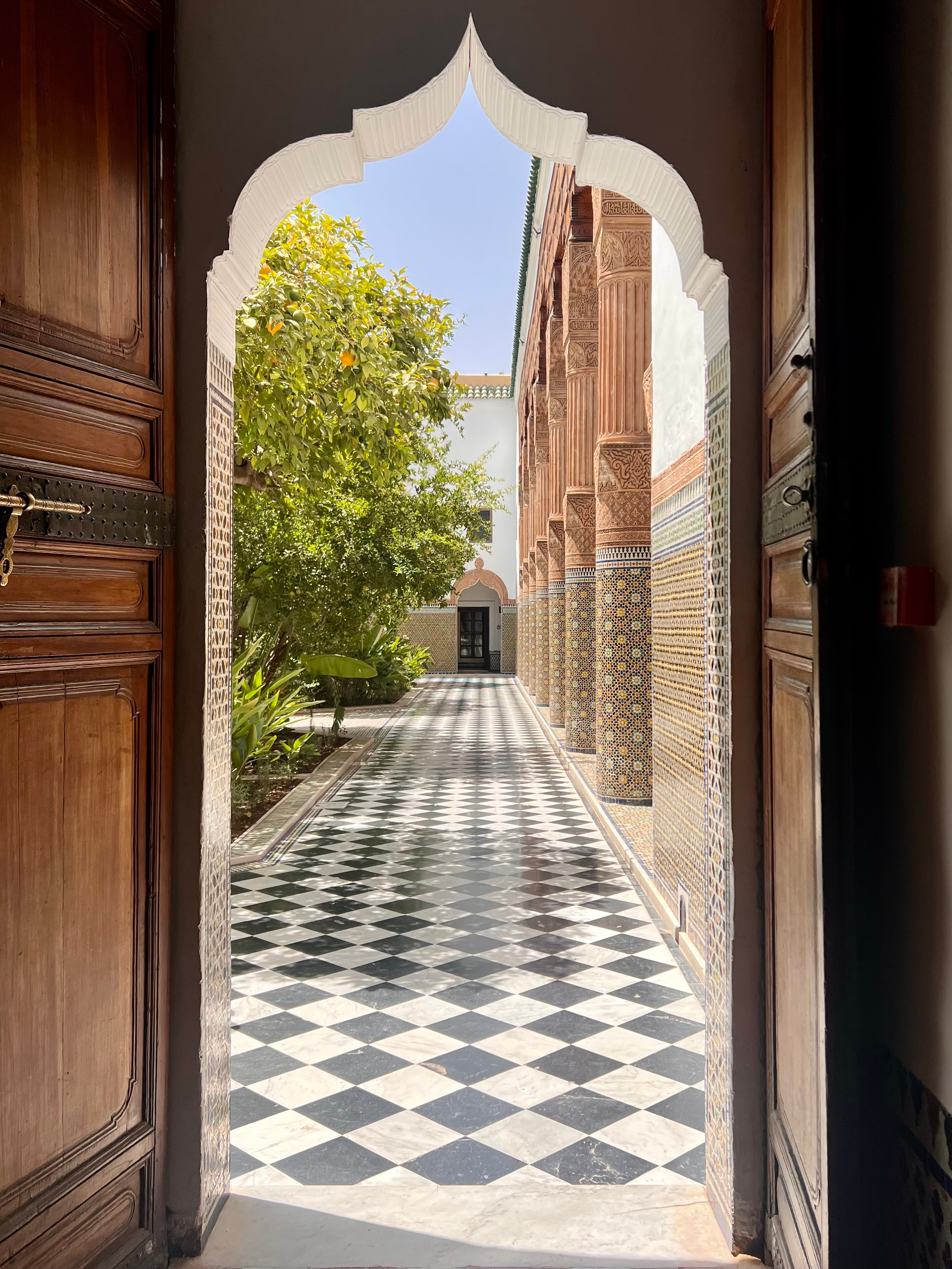
- Photo taken stood in front of the description board this is quoted from, looking just to the left into the courtyard of the museum.
Reference List
Thompson, C. (2020) Sea People: In Search of the Ancient Navigators of the Pacific. Paperback edition. London: William Collins
Dar El Bacha Museum (visited 14/08/25) Patti Birch Collection: A Universal Language, A Shared Humanity, Marrakesh, Morocco
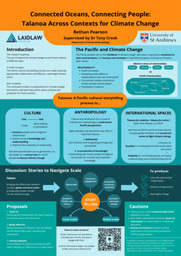
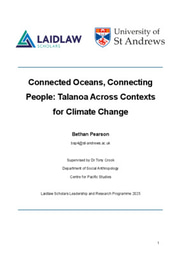


Please sign in
If you are a registered user on Laidlaw Scholars Network, please sign in